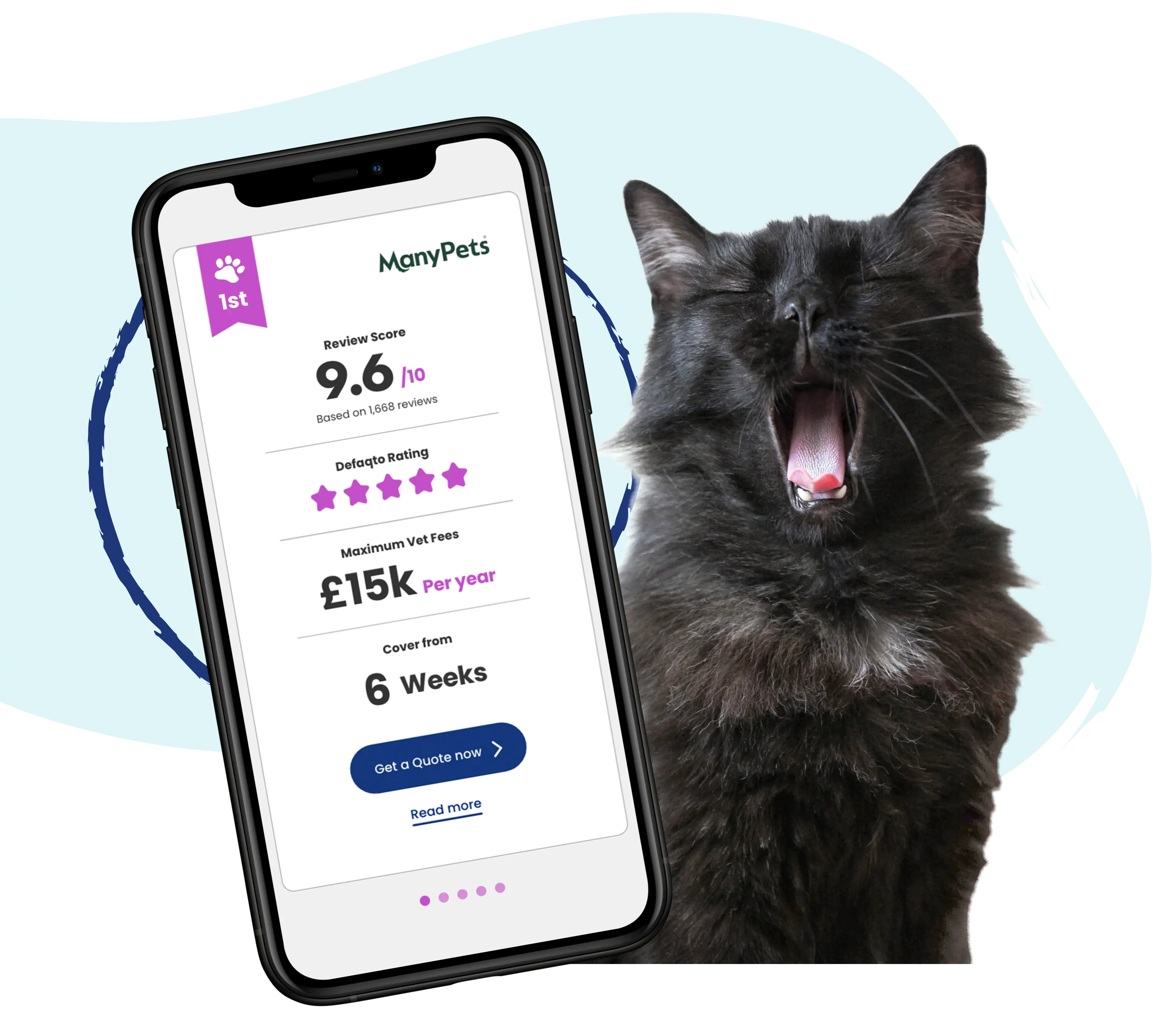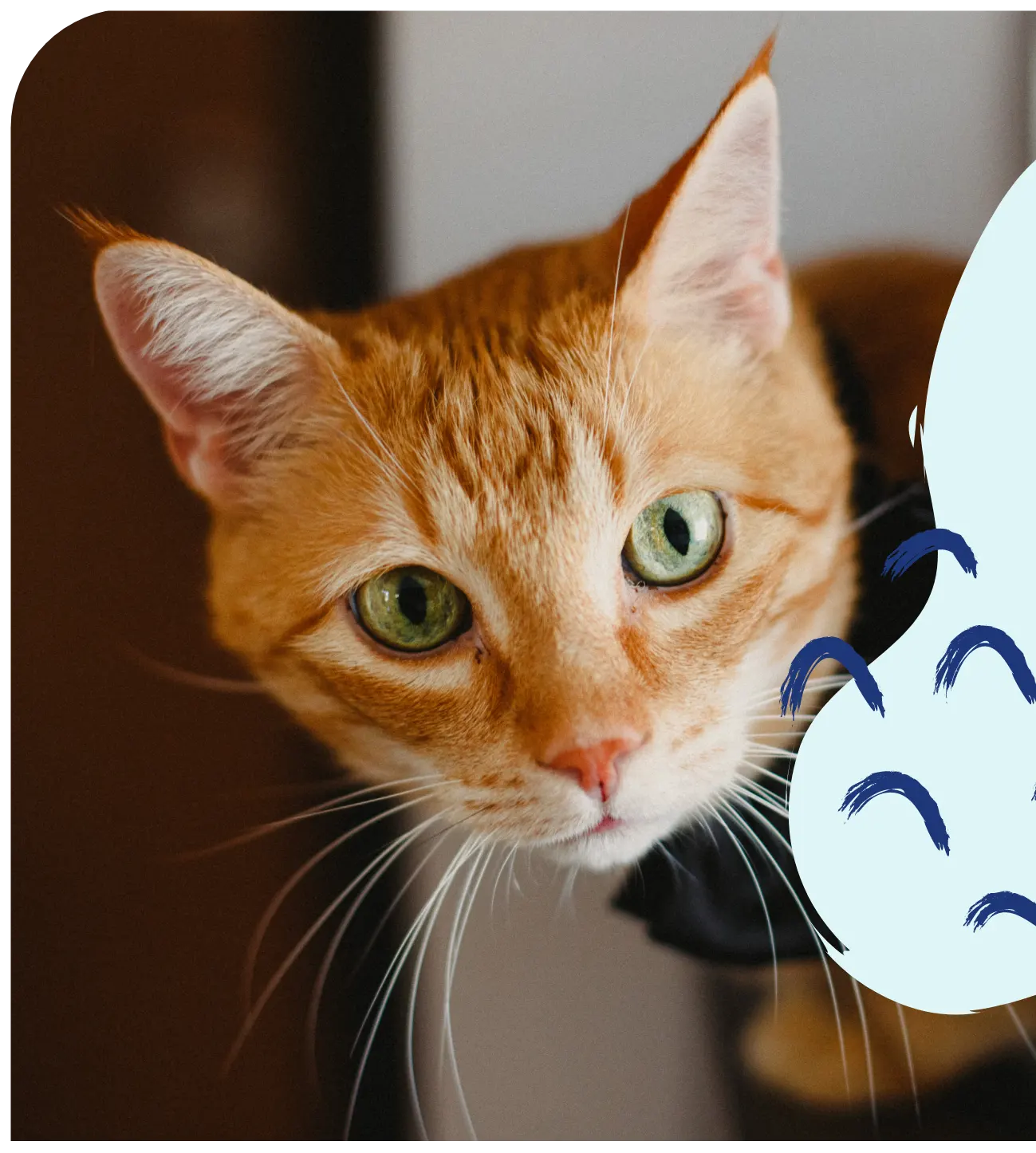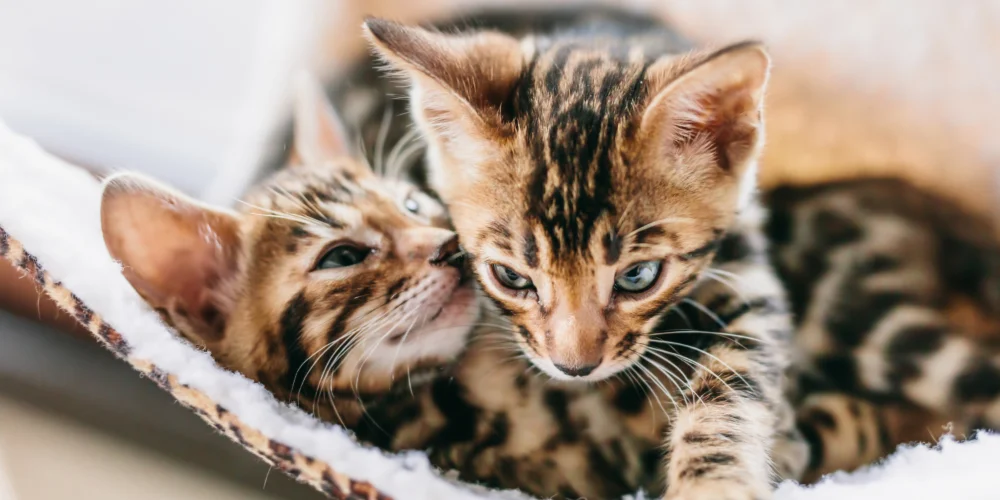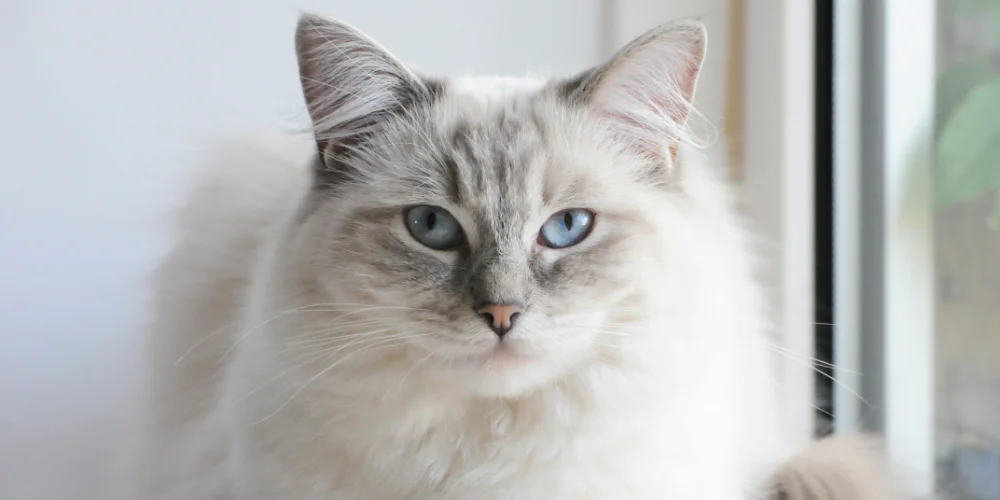
Relax.
Get the best  insurance for your cat.
insurance for your cat.
Get a Quote

Finding the right insurance for your cat.
Get your feline friend covered for accidents and injuries by securing the best cat insurance coverage. We scour the web to find the top-rated insurance deals in the UK – so you don’t have to.
Get a Quote
Top Rated Providers
We’ve ordered our comparison table by review score, which is the average weighted score based on product quality and user reviews from the last 12 months. Click here to learn how our review score is calculated.
-
1stReview Score9.2/10
Based on 101,253 reviews
Defaqto RatingMaximum Vet Fees:£15,000per policy yearGet a Quote Read moreExcess:£99per condition -
2ndReview Score9.0/10
Based on 7,796 reviews
Defaqto RatingMaximum Vet Fees:£12,500per policy yearGet a Quote Read moreExcess:£95per condition -
3rdReview Score8.9/10
Based on 82,667 reviews
Defaqto RatingMaximum Vet Fees:£12,000per policy yearGet a Quote Read moreExcess:£109per condition -
4thReview Score8.9/10
Based on 4,535 reviews
Defaqto RatingMaximum Vet Fees:£12,000per policy yearGet a Quote Read moreExcess:£99per condition -
5thReview Score8.8/10
Based on 3,543 reviews
Defaqto RatingMaximum Vet Fees:£6,000per policy yearGet a Quote Read moreExcess:£130per condition -
6thReview Score8.8/10
Based on 38,001 reviews
Defaqto RatingMaximum Vet Fees:£8kper conditionGet a Quote Read moreExcess:£99per condition -
7thReview Score8.7/10
Based on 16,100 reviews
Defaqto RatingMaximum Vet Fees:£15kper policy yearGet a Quote Read moreExcess:£120per condition -
8thReview Score8.7/10
Based on 4,075 reviews
Defaqto RatingMaximum Vet Fees:£12kper policy yearGet a Quote Read moreExcess:£100per condition -
9thReview Score8.6/10
Based on 4,728 reviews
Defaqto RatingMaximum Vet Fees:£3.25kper conditionGet a Quote Read moreExcess:£99per condition -
10thReview Score8.4/10
Based on 16,823 reviews
Defaqto RatingMaximum Vet Fees:£10kper policy yearGet a Quote Read moreExcess:£50per condition -
11thReview Score8.3/10
Based on 4,825 reviews
Defaqto RatingMaximum Vet Fees:£10kper policy yearGet a Quote Read moreExcess:£250per condition -
12thReview Score8.3/10
Based on 1,835 reviews
Defaqto RatingMaximum Vet Fees:£7kper policy yearGet a Quote Read moreExcess:£99per condition -
13thReview Score8.2/10
Based on 16,531 reviews
Defaqto RatingMaximum Vet Fees:£10kper policy yearGet a Quote Read moreExcess:£80per condition -
14thReview Score8.1/10
Based on 918 reviews
Defaqto RatingMaximum Vet Fees:£10kper policy yearGet a Quote Read moreExcess:£99per condition -
15thReview Score8.1/10
Based on 2,910 reviews
Defaqto RatingMaximum Vet Fees:£4kper policy yearGet a Quote Read moreExcess:£140per condition -
16thReview Score7.7/10
Based on 1,437 reviews
Defaqto RatingMaximum Vet Fees:£10kper policy yearGet a Quote Read moreExcess:£80per condition -
17thReview Score7.6/10
Based on 15,594 reviews
Defaqto RatingMaximum Vet Fees:£4kper conditionGet a Quote Read moreExcess:£100per condition -
18thReview Score7.5/10
Based on 2,769 reviews
Defaqto RatingMaximum Vet Fees:£10,000per policy yearGet a Quote Read moreExcess:£0per condition -
19thReview Score7.2/10
Based on 528 reviews
Defaqto RatingMaximum Vet Fees:£10kper policy yearGet a Quote Read moreExcess:£90per condition -
20thReview Score6.9/10
Based on 890 reviews
Defaqto RatingMaximum Vet Fees:£8kper policy yearGet a Quote Read moreExcess:£75per condition -
21stReview Score6.1/10
Based on 283 reviews
Defaqto RatingMaximum Vet Fees:£12kper policy yearGet a Quote Read moreExcess:£100per condition -
22ndReview Score5.6/10
Based on 207 reviews
Defaqto RatingMaximum Vet Fees:£10,000per policy yearGet a Quote Read moreExcess:£120per condition -
23rdReview Score3.4/10
Based on 1,003 reviews
Defaqto RatingMaximum Vet Fees:£8kper policy yearGet a Quote Read moreExcess:£100per condition
Most cat insurance quotes are provided via Quotezone, who are FCA regulated.
Please note that some of the providers included within our table are not currently offering new policies.

1000s of reviews, all in one place
We have reviews from 1000s of real customers to offer transparency and choice on one page — helping you make the best decisions for your cat. Why don’t you see what cat owners who have secured their pet insurance through Compare By Review have to say?
-
Charlotte MortCover PurchasedReviewed without invitationReviewed the Claims experience on 29 May 2025
1 out of 5 paws
Won’T Pay Out Check Your Inner Limits
Never heard of inner limits - just another reason not to pay out. When our dog was injured wouldn’t pay out due to inner limits - DO NOT INSURE WITH SCRATCH AND PATCH waste of time-
Recieved a response over 5 days after their claim was submitted
-
Claim wasn't successful
-
Was neither happy or unhappy with their experience when they spoke to someone
-
-
Trish MchughCover PurchasedReviewed without invitationReviewed the Claims experience on 22 May 2025
1 out of 5 paws
Avoid At All Costs
Perfect pet insurance company are refusing to pay for my dogs operation to have a struvite bladder stone removal based on the fact that she has cystitis last year and are calling it a pre existing co…-
Recieved a response within 1-2 days after their claim was submitted
-
Claim wasn't successful
-
Was neither happy or unhappy with their experience when they spoke to someone
-
-
Very Unhappy CustomerCover PurchasedReviewed without invitationReviewed the Claims experience on 21 May 2025
1 out of 5 paws
Avoid At All Costs – Misleading And Avoidant
Ageas Pet Insurance has been one of the most frustrating companies I’ve ever dealt with. They are deliberately avoiding paying out a legitimate claim, despite having received all the necessary eviden…-
Recieved a response over 5 days after their claim was submitted
-
Claim is still unresolved
-
Was neither happy or unhappy with their experience when they spoke to someone
-
-
JoCover PurchasedReviewed without invitationReviewed the Claims experience on 17 May 2025
1 out of 5 paws
Terrible!
I was transferred to Ageas by default after my previous pet insurer went under. Based on my experience, I would strongly advise anyone looking for pet or car insurance to consider other providers. …-
Recieved a response over 5 days after their claim was submitted
-
Claim wasn't successful
-
Was neither happy or unhappy with their experience when they spoke to someone
-
-
Linda MeenanCover PurchasedReviewed without invitationReviewed the Claims experience on 14 Apr 2025
4 out of 5 paws
Happy Customer
I have been with the company for almost seven years. I have had two large claims over 1,600 pounds which were settled without a problem. It can be around twelve weeks wait but considering the …-
Recieved a response over 5 days after their claim was submitted
-
Claim was success and paid out
-
Was neither happy or unhappy with their experience when they spoke to someone
-
-
Mary LloydCover PurchasedReviewed without invitationReviewed the Claims experience on 17 Feb 2025
1 out of 5 paws
Insurance
Being paying In for 26 months I had to have my dog put to sleep and have been told that I have not paid in enough to claim so anyone who wants to insure there pet do not go with purley pets insurance…-
Recieved a response over 5 days after their claim was submitted
-
Claim wasn't successful
-
Was neither happy or unhappy with their experience when they spoke to someone
-
-
Hailey YuCover PurchasedReviewed without invitationReviewed the Claims experience on 24 Jan 2025
1 out of 5 paws
Review
If there is a negative rating, I would give a negative rating. Here is our story. We are first timer pet owners just over worrying about our puppy in the first month. There are minor skin, ear and…
-
Recieved a response over 5 days after their claim was submitted
-
Claim wasn't successful
-
Was neither happy or unhappy with their experience when they spoke to someone
-
-
MichelleCover PurchasedReviewed without invitationReviewed the Claims experience on 2 Jan 2025
1 out of 5 paws
Terrible
Put a claim in for my dog on 7th August, I paid excess plus 20% of the bill as per policy, the vet signed her off no more treatment needed september , 5 months later the vet is still waiting for pay…-
Recieved a response over 5 days after their claim was submitted
-
Claim wasn't successful
-
Was neither happy or unhappy with their experience when they spoke to someone
-
-
KatCover PurchasedReviewed without invitationReviewed the Claims experience on 24 Dec 2024
1 out of 5 paws
Pointless
Have had no success with any claim for our pet leaving up paying for a useless policy cover as well as expensive vet bills. Total waste of time sadly.-
Recieved a response over 5 days after their claim was submitted
-
Claim wasn't successful
-
Was neither happy or unhappy with their experience when they spoke to someone
-
-
K TroughtCover PurchasedReviewed without invitationReviewed the Claims experience on 23 Dec 2024
1 out of 5 paws
Never Pay Claim In Full
Avoid if you want peace of mind, never pay and not transparent on cover-
Recieved a response within 3-4 days after their claim was submitted
-
Claim wasn't successful
-
Was neither happy or unhappy with their experience when they spoke to someone
-


How does it work?
We help you find the best cat insurance on the market with our easy-to-use comparison tables!
Use our Review Scores to identify top cat insurance providers.
Begin your FREE cat insurance quote on our platform.
Tell us your cat’s details and medical history.
Get a quote for quality cat insurance in less than 60 seconds.
No hassle, no tricks — just the best cover for your feline friend.
In this Guide
- What types of cat insurance can I get?
- What does cat insurance cover?
- What's not covered?
- How much does cat insurance cost?
- Compare cat insurance
What types of cat insurance can I get?
Accident-only
Accident-only policies cover the cost of treatment if your cat is involved in an accident. Typically, this is the cheapest type of cat insurance you can get as it offers the least extensive cover. Some providers offer accident and illness policies that cover your cat if they become ill as the result of an accident, but most exclude illnesses entirely.
Time-Limited
Time-limited cat insurance covers the cost of vet fees over a 12-month period from the date you first noticed the illness or injury. When the 12-month period ends, your cat will no longer be covered for the particular injury you claimed for, even if you renew your policy.
Maximum-Benefit
Maximum-benefit policies allow you to claim for illnesses and injuries up to a pre-set limit. This is typically seen as the mid-range option. With a maximum-benefit policy, you can claim for the same condition more than once, unlike time limited policies. However, once you’ve reached the maximum amount, you’ll have to pay for further treatment yourself.
Lifetime
Lifetime cat insurance covers accidents, illnesses and conditions throughout the lifetime of the policy. The limit is renewed each year. As lifetime policies offer the most comprehensive level of cover, they tend to be the most expensive. If your pet develops an ongoing condition that you want to cover for life, you’ll need to renew your lifetime policy yearly or find a new policy that covers pre-existing conditions.
Top tip: Make sure you understand the kind of health conditions your cat will be susceptible to and think about its medical history. This will help you to pick the best cat insurance cover.
What does cat insurance cover?
This will vary depending on the type of policy you take out but most cat insurance policies provide cover for the following:
-
Vet fees: If your cat needs veterinary treatment, you’ll be able to claim back the cost of vet fees.
-
Theft or straying: If your cat goes missing or is stolen, you can claim back the cost of paying for a reward and advertising.
-
Death: You can claim back the amount that you paid for your cat is they pass away because of an accident or illness.
- Boarding fees: If you have to go to hospital and can’t look after your cat, cat insurance can cover the cost of putting your cat in a cattery.
What's not covered?
Before you take out a policy, make sure you read the terms and conditions thoroughly to check exactly what your cat is and isn’t covered for. Common exclusions include:
-
Pre-existing medical conditions: Most pet insurers won’t cover your cat for pre-existing conditions. Although ManyPets have created a specific pre-existing pet insurance policy to ensure your pet can get some form of cover, despite having an existing condition.
-
Routine treatments: Treatments such as grooming, flea treatment, worm treatment, nail clipping, spaying and castration are typically excluded.
-
Dental treatment: The majority of cat insurance policies won’t cover your cat for dental treatment, although more comprehensive policies might offer some cover.
-
Breeding and pregnancy: Complications associated with breeding and pregnancy are often not covered.
- Euthanasia and burial: Most insurers don’t cover euthanasia and burial costs.
How much does cat insurance cost?
You can get a lifetime cat insurance policy for as little as £8.11 per month according to Compare by Review data in November 2020.*
*This figure is based on lifetime pet insurance for accidents and illnesses for a three-year-old Bengal who has been spayed and chipped, costs £600 and lives at a CM postcode.
The amount you pay for cat insurance for your kitten will depend on a range of factors, mainly the type of policy you choose. The more comprehensive the policy, the more expensive your premium will be, for example, accident-only cat insurance is far cheaper than lifetime cat insurance.
Your postcode will also impact the amount you pay because the cost of vet treatment is higher in some parts of the UK. If you live in an area where treatment is known to cost more, it’s likely that you’ll have to pay a higher premium.
Pet insurance for older cats generally costs more too as older cats are at higher risk of developing health problems or illnesses. And finally, if you have a pedigree cat, you can expect to pay more to insure your cat.
Cat Insurance Guides
Check out our insurance guides for more information


























